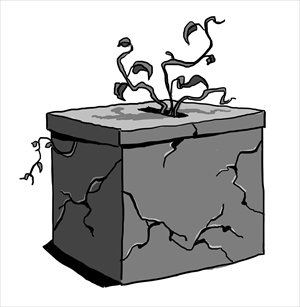Asian voters may prefer bribes to bureaucrats

In Bangkok governor election on Sunday, voters showed unprecedented enthusiasm. In many districts, the voter turnout was more than 70 percent. Practicing one's democratic rights seems deeply rooted in Thailand.
However, talking to voters, I found a problem related to efficient and clean governance, which casts some doubt on the election's effectiveness.
I was invited to attend a dinner party held by Chinese Thai businessmen one day before the election. During the party, one businessman told us that he planned to vote for Sukhumbhand Paribatra, the candidate from the opposition Democratic Party. The reason he gave was simple: He was bothered by one thing when former prime minister Thaksin Shinawatra, now exiled, was in office.
Thaksin is incumbent Prime Minister Yingluck Shinawatra's brother. The currently ruling Pheu Thai Party, as the descendant of Thaksin's Thai Rak Thai Party, supports Thaksin's policies.
According to this businessman, the Thaksin administration once had a crackdown on tax evasion, and temporarily confiscated millions of baht from him for "strict examination," following legal procedure.
That was not the first such case. According to "common practice" as he put it, the problem could be solved at once if he'd like to pay a small bribe. He thus offered a bribe, but was refused by the tax officials. He raised the offer, but was refused again. It turned out that "a great amount of money" was deducted from the payment, following the regulations.
"From then on, I never voted for Thaksin or the people around him. They don't follow common practice, which bothers me a lot," he said.
I have no idea how many voters practiced their rights with the same mentality. But the complaint from this businessman raises the question: What kind of government do voters want?
Corruption has been an important trigger of discontent among the Thai public as well as a source of finger-pointing from Western media. But for this businessman, a certain level of corruption seems better than zero corruption.
Management based on strict systems is good, but the problem is that if some troubles can be instantly solved through bribes, many people, especially in Asia, automatically lean to the latter choice.
In most circumstances, completely obeying rules may mean being caught in an endless net. "Being strict" becomes a synonym for bureaucracy, and people are forced to choose between bureaucracy and bribery.
If people need to spend tons of time and energy just to get one thing done, they will naturally choose bribery as a shortcut, even if they half-realize this may lead up to ever-increasing bribes.
Is it possible to have a system which is both highly efficient and totally immune to corruption? This is possible in theory, but such a system can hardly exist in reality. Especially in countries with an Eastern culture, it is almost impossible to build a totally impersonal system.
The result of the Bangkok governor's election pleased the businessman. Sukhumbhand Paripatra won the election and was successfully reelected. It is unknown how many voters voted for the Democratic Party candidate for similar reasons to him. But it is certain that Bangkok has the highest percentage of middle-class voters in Thailand.
These voters are relatively rich, and are more willing to live in a society that operates according to "common practice," though such practice is different from textbook democracy and good governance.
This is the reality of the democracy in Thailand, and it is unknown yet how such a reality can influence future changes in Thailand's political system. But one thing is for sure: The "one man, one vote" system can bring many unexpected results in the East.
The author is a senior editor with People's Daily. He's now stationed in Bangkok. dinggang@globaltimes.com.cn